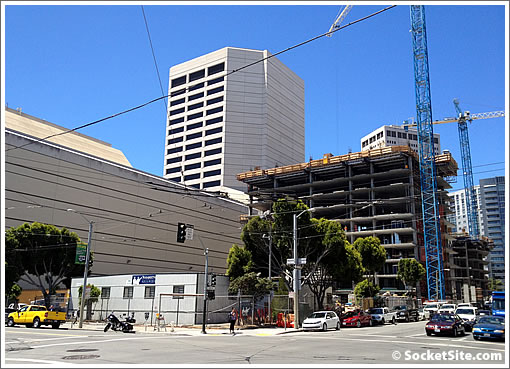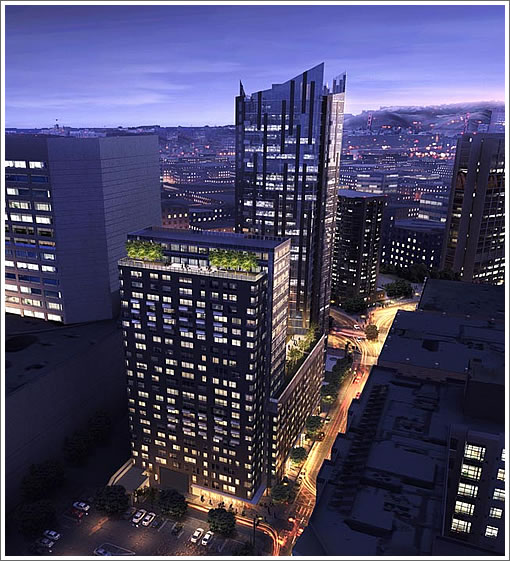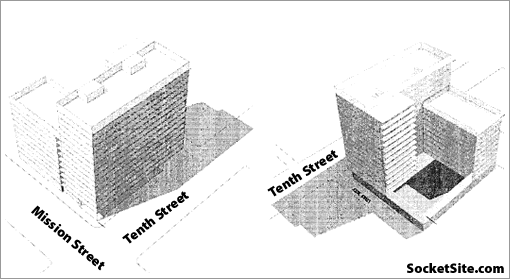
The entire west side of Tenth Street between Market and Mission was first approved for development in 2004 and called for the building of a 150-foot-tall affordable housing building on the corner of Mission and Tenth, a 200-foot-tall residential building on Tenth, and a 320-foot-tall municipal office building on the corner of Tenth and Market.
The site was split in 2007, the office use was dropped, and the northern two-thirds of the block was sold to Crescent Heights which first envisioned a 700-unit condo development which has since morphed into the 749-unit project that’s rising at 1401 Market Street.

Currently leased to the builders of 1401 Market for construction staging, the plans for the site at 1400 Mission Street at Tenth have since been revised. And yes, the rooftop gardens once proposed for the portions of the building fronting Mission and Tenth Street are old news and long gone. The currently proposed project is ten stories along Mission Street and fifteen along Tenth Street with a podium courtyard on the second floor.

Having partnered with Maracor, the TNDC led project is slated to yield 197 units of for-sale affordable family housing, including 87 two-bedroom condos and 24 three-bedrooms, over 5,000 square feet of ground floor commercial/retail space and parking for 48 cars by 2015.
Households earning between 70% and 150% of the Area Median Income (AMI) will qualify for the condos. And with respect to parking for bikes, the latest plans call for 66 spaces up from the 13 spaces approved in 2004.
∙ Market Rate Development On Track In SF, Affordable Housing Isn’t [SocketSite]
∙ Crescent Heights: 10th And Market Recap, Rendering, And Details
∙ 1401 Market Street: Redesigned And Cleared For Construction [SocketSite]
∙ Affordable Housing Headwinds And TNDC’s New Tack In San Francisco [SocketSite]
∙ Upping The Ante For Bicycle Parking In San Francisco [SocketSite]

Subsidies for households making “only” $140K per year?
If you want more affordable housing, build more houses. When will the Progressives figure it out; you can’t legislate affordability
Not long ago this was a rat-infested blighted lot. Nice to see this is getting filled fast.
The problem with subsidized and/or affordable housing is that by design it is bound to be unfair. Why would someone making 130K deserve a break when someone making 150K will not?
Building new housing would solve the problem. There are so many underdeveloped lots in SOMA and around.
By the way, counties with median incomes in the $30Ks would be floored to learn we have an affordable housing problem with people making 6 figures 😉
It’s a good problem to have, considering this economy.
What does this do to homes that are affordable at the top of that income range? For example, let’s say I’m budgeted for a 150k salary and decide I can afford a 700k home. Then you want to sell that home. A would be buyer making 140k is thinking, “Why would I buy a 700k home when I could get affordable housing for half of that?” That would mean significantly fewer buyers for the guy who paid market value on his home. How is this good economics?
It comes up every time an affordable housing project gets highlighted on socketsite. Okay, i’ll bite since I at least understand the opposition’s arguments, I can play devil’s advocate.
Hey market fundamentalists: your much vaunted “free market” in condos failed and continues to fail to deliver affordable housing, so government intervention is being applied to the problem. That’s why this is happening.
The Planning Commission and The Board of Supervisors are all well aware of your Econ 101-inspired arguments as to how to produce more housing. They’ve explicitly rejected them, okay? The Board doesn’t get to operate in the world of theoretical first year economics.
Read a meeting transcript now and then or perhaps watch a meeting online. You’ll learn a lot about public policy and how it differs from and is informed by what you learned in freshman econ.
Legacy Dude: the absolute amount isn’t what’s relevant, what that household income buys is. If the median HHI was half of that, and it allowed such a household to buy a two bedroom apartment, say, then we wouldn’t be discussing this because “the free market” would be operating in an acceptable manner. The Board of Supervisors, and by extension, San Francisco voters, don’t think the current situation is acceptable, and that could be true with the median HHI double what it is now.
To marko1332, above: more housing is being built. But the overwhelming majority of new proposed condo projects are luxury projects aimed at the top 1%. The Board of Supervisors, and by extension, San Francisco voters, don’t think the current situation is acceptable, so we have affordable housing projects like this one.
To lol, yes, from that perspective this is “unfair”. However, it’s not clear that doing nothing (i.e., having no intervention, even from nonprofits like The Tenderloin Neighborhood Development Corporation), which would be “fairer”, would help more people in the real, present, non-theoretical world.
I happen to agree with you it would be best to upzone and build on undeveloped SOMA lots and current surface level parking lots, underdeveloped lots, etc. But there’s no guarantee that left to it’s own devices, “the free market” wouldn’t just produce more luxury pied-à-terres for the global 1% on those lots.
Howe come there is no affordable housing problem in Houston (unless maybe you are homeless)? No zoning, no rent control, streamlined and easy permit approval. There is no need for mandates and government subsidies to get affordable housing. That’s not market fundamentalism, it’s fact. But bury your head in the sand, dear “progressives” and console yourself that maybe 1% of the population gets these “affordable” units while everyone else must move 20-30 miles out of San Francisco or to a slum to find less expensive housing.
^Funny that Houston also has extremely hot and humid weather (a fact, as you said), per capita income laughably lower than SF (another fact), and absurdly lower educational levels of the populace (yet another fact).
Should we assume that one of those reasons is the reason for low housing costs in Houston? Or must it be one of your reasons?
Note – I’m not even arguing that you’re wrong, just that loudly proclaiming that one set of issues is the cause of something is 100% stupid.
Brahma,
There should have been affordable housing provided by the last frenzy of condo overbuilding. And many decent units were sold at 30 to 40% discounts between 2009 and 2010, often enough to make them affordable to people making between 100 and 140K.
It’s just that the next micro-economic wave caught up on the Bay Area faster than we all expected. The good affordable deals has to be snatched up fast.
A friend in this salary range got one of these very decent deals. You needed to be ready and not expect to get “something for nothing” as many people do here.
Mark, it might, just might, have something to do with the fact that Houston is 656.3 square miles with a population of 2.1 million (or 3,200 people per square mile) compared to SF’s 46.9 square miles with a population of 805,000 (or 17,164 people per square mile).
I am sure that if increased our land by 14x while only increasing our population 2.6x there would be a dramatic change in the affordability of our housing.
Good luck crossing Houston on your track bike from one end to the other. SF? 35minutes to 50 minutes depending on the path you take.
That would mean significantly fewer buyers for the guy who paid market value on his home. How is this good economics?
…so the price would drop on that home. If your goal is housing affordability, that’s excellent economics. If your goal is to maximize the profit for sellers, that’s bad economics, but frankly that’s not a very good goal.
Hey market fundamentalists: your much vaunted “free market” in condos failed and continues to fail to deliver affordable housing, so government intervention is being applied to the problem. That’s why this is happening.
Uh-huh. What I want to know is, how likely is it that a family with the requisite income will be able to actually buy one of these units? Is it just a matter of showing up, demonstrating that you fill the requirements, taking a tour, choosing one, and signing on the dotted line? Or do you have to enter into a lottery to do it, with no guarantee of success?
Because if it’s a lottery, then it’s hardly affordable, is it? Anyone can go down to the corner and buy a $3 ticket to win tens of millions. Does that mean that Pacific Heights mansions are affordable for everyone? Obviously not.
To actually make these condos affordable would require SF to build so many that there would be one for anyone who wanted one. And that’s not happening. As it is, it’s a lottery– lovely for whoever wins but of dubious importance to anyone else, and I’m not sure that’s worth the public cost.
Did someone just compare SF to Houston?! Houston?
Just might be the funniest thing I have ever read on here LOL!
I suspect that if you took all the road surface needed to make Houston so “attractive” and compressed it into the same area that the same population occupies in SF and its peninsula burbs, there’d be very little room for actual housing.
So you snobs are saying that Houston isn’t a world class city (environmental issues notwithstanding)? But seriously, have you tried finding good cajun food in SF? I, for one, could really go for some good crawfish etouffee…
^Correct, Houston is not a world class “city”. A very important and well-known place of human settlement, with some damn good food? Absolutely. A city? No.
Boo! What happened to the building with the cool roofline?
I do love my SF. But c’mon snobs. Houston is not bad. Intact I just checked metropolitan GDP list for us cities and Houston is in top 5. Guess where SF is? 7 or 8th. So, saying its not city is absurd.
Any market where government actively interfers creats distortions an highly ineffective. History has proven it. I am not or unregulated free market. But, definitely regulated one works much better.
This building looks cool at least from sky view.
More to the point, Houston does have a form of zoning: it has strict parking minimums, which effectively ban the construction of anything like what exists all over San Francisco. For instance, a small neighborhood bar of 2,000 square feet, as you can find all over San Francisco, would require 20 parking spaces– about a 6,600 square foot lot. It’s interesting to speculate on what might have happened if those policies had been implemented here and strictly enforced, but my guess is that there would be far fewer businesses operating, far fewer restaurants, fewer immigrants, fewer tourists, fewer jobs, and far less of what makes SF unique (in the US) and desirable. It would be affordable simply because there would be little reason to live here among deteriorating buildings no one has any reason to maintain.
Another thought: AAA listed the average cost of car ownership at $8900 this year. If you need an extra car in Houston, that alone puts a sizable dent in your savings.
Earlier, I wrote:
I went out to the MLS and looked at all condos, regardless of price, in district 9F and G.
You get three 3 listings, two 1BR/1BA units at “the luxurious Millennium Tower” asking between $849k (w/ $818 HOA) and $899k (w/ $826 HOA), and one “ultra-desirable & sophisticated 2 bedroom, 2 bath luxury residence” at SOMA Grand asking $999k ($685).
I think there’s something to the objection that Alai raises about lotteries given that demand for these condos will probably outstrip supply, but a project that actually produces 197 units, “including 87 two-bedroom condos and 24 three-bedrooms” is better than nothing and I think well worth the cost. All of us should wish Maracor and the TNDC good luck.
Scratch the above description at 7:10 PM of what is currently on the market via the MLS; I meant to add “in this general neighborhood”, but I don’t even think I got that right.
I still think this is a worthwhile condo project. 2015 is a long ways off.
Intact I just checked metropolitan GDP list for us cities and Houston is in top 5. Guess where SF is? 7 or 8th. So, saying its not city is absurd.
You’re looking at totals, not per capita. Houston’s MSA has almost two million more people than SF’s MSA.
I think it is completely asinine to build for-sale below market condos when they’ve proven a total bust in recent years because HOA dues quickly rise … And suddenly, the City is paying HOA dues on for-sale affordable units that are vacant because few people can meet the income requirements AND qualify for a mortgage AND keep up with increasing market-rate HOA dues. The only affordable housing that should be bult is rentals, period.
Is there an organized and credible effort to end the waste of resources being thrown towards “affordable” housing? I’d like to subsidize that.
I’m totally open to funding better wages for city employees, schools, healthcare, etc.
But spending tax dollars to subsidize new condos for households making 6 figures who happen to pick the winning lottery ticket? What a total bonehead and unfair allocation of resources.
Which is it? Are affordable units the lucky lottery prize for a few buyers, or are they languishing on the market, with the City paying HOAs, as Jamie says?
Making affordable housing available to lottery winners only is a failed and rather revolting public “policy.”
Affordability debate aside, I can’t believe that the city didn’t push for some actual green space on this patch of land. SOMA needs as much of it as possible with every new development. And it would be nice if these properties had a better connection to the streets to facilitate better ‘community’ and outward facing exposure, instead of it all being inward including a ‘second story podium courtyard’ — pathetic. It’s a Mission Bay new development all over again. Doesn’t anyone think about what has made SF so special as it has aged? It’s the way that people are bound to a street and how they interact with that street and surounding area that make neighborhoods special. This sounds like another closed-in box.
Yes, Houston is in the top 5 of American cities:
For parking lots, pickups and big hair.
And now that Pancho’s Mexican Buffet suddenly closed down after decades of service Houston and other Texas cities are suddenly less appealing.
Houston has world class restaurants, museums, and fine arts organization. And a diverse population. Plus a lot of affordable housing. The city voted for Obama. It’s not some hick rural Texas town.
You can go on thinking that, but of course The City isn’t making policy assuming that a catastrophic once-in-a-generation housing credit bubble deflation is going to happen again in the near to medium term future.
As Dan alludes to above, it’s entirely possible, hell, highly probable, that all the “for-sale affordable units that are vacant” you mention as raising your ire will be sold once this project, not to mention others, are completed. And if they aren’t, then there’s no complaining about a lottery, since there will be enough units to go around. Win-Win.
I’m not a land use attorney, but from what I’ve read this would be highly problematic in the aftermath of both the Governor’s elimination of Redevelopment Agencies in 2011 and the Second District Court of Appeals’ ruling in Palmer/Sixth Street Properties vs. City of Los Angeles in 2009, if not impossible.
UPDATE: 1400 Mission Street: The 197 Affordable Condos On The Other Corner.